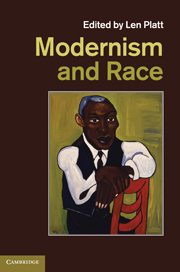Book contents
- Frontmatter
- Contents
- Notes on contributors
- Introduction
- 1 Germanism, the modern and ‘England’ – 1880–1930: a literary overview
- 2 ‘All these fellows are ourselves’: Ford Madox Ford, race and Europe
- 3 ‘’Tis optophone which ontophanes': race, the modern and Irish revivalism
- 4 Generating modernism and New Criticism from antisemitism: Laura Riding and Robert Graves read T. S. Eliot's early poetry
- 5 Race, modernism and the question of late style in Kipling's racial narratives
- 6 Atlantic modernism at the crossing: the migrant labours of Hurston, McKay and the diasporic text
- 7 Claude McKay in Britain: race, sexuality and poetry
- 8 Wyndham Lewis and the modernists: internationalism and race
- 9 ‘Until Hanandhunigan's extermination’: Joyce, China and racialised world histories
- 10 Race, gender and the Holocaust: traumatic modernity, traumatic modernism
- Index
- References
7 - Claude McKay in Britain: race, sexuality and poetry
Published online by Cambridge University Press: 03 May 2011
- Frontmatter
- Contents
- Notes on contributors
- Introduction
- 1 Germanism, the modern and ‘England’ – 1880–1930: a literary overview
- 2 ‘All these fellows are ourselves’: Ford Madox Ford, race and Europe
- 3 ‘’Tis optophone which ontophanes': race, the modern and Irish revivalism
- 4 Generating modernism and New Criticism from antisemitism: Laura Riding and Robert Graves read T. S. Eliot's early poetry
- 5 Race, modernism and the question of late style in Kipling's racial narratives
- 6 Atlantic modernism at the crossing: the migrant labours of Hurston, McKay and the diasporic text
- 7 Claude McKay in Britain: race, sexuality and poetry
- 8 Wyndham Lewis and the modernists: internationalism and race
- 9 ‘Until Hanandhunigan's extermination’: Joyce, China and racialised world histories
- 10 Race, gender and the Holocaust: traumatic modernity, traumatic modernism
- Index
- References
Summary
In recent years much attention has been given to modernism and the postcolonial, to how the writing strategies from an earlier stage of economic and social modernisation in ‘the West’ may now be alive and current forms in contemporary non-Western societies. We can though make a concomitant point about non-Western writing from the first half of the twentieth century. Important texts exist from the period that are not best served by looking at them solely through the lens of Western modernism, which is of course not to deny that economies, societies and cultures were changing world-wide under late colonialism. It is right to explore, for example, the contribution of late-colonial uncertainty to Western modernism and how ‘outsiders’ staffed the modern movement. However, such examinations do not in and of themselves constitute an adequate engagement with the wider world.
Such an argument may seem straightforward, even obvious, but it runs against the direction of travel of much work in contemporary modernist studies. Texts have been incorporated – re-colonised one might say – within an expanded definition of modernism, with the differences and specificities of context ironed out. The harsh, sundering hierarchies that operated between, for example, colonisers and colonised, races, genders and sexualities have too often simply been set aside. Including texts from outside the West within an expanded definition of modernism may look open and progressive, but the danger is that texts which demonstrate ready affinities with what is already known and valorised will be privileged, while what looks different will be judged negatively and dismissed.
- Type
- Chapter
- Information
- Modernism and Race , pp. 137 - 155Publisher: Cambridge University PressPrint publication year: 2011
References
- 2
- Cited by



